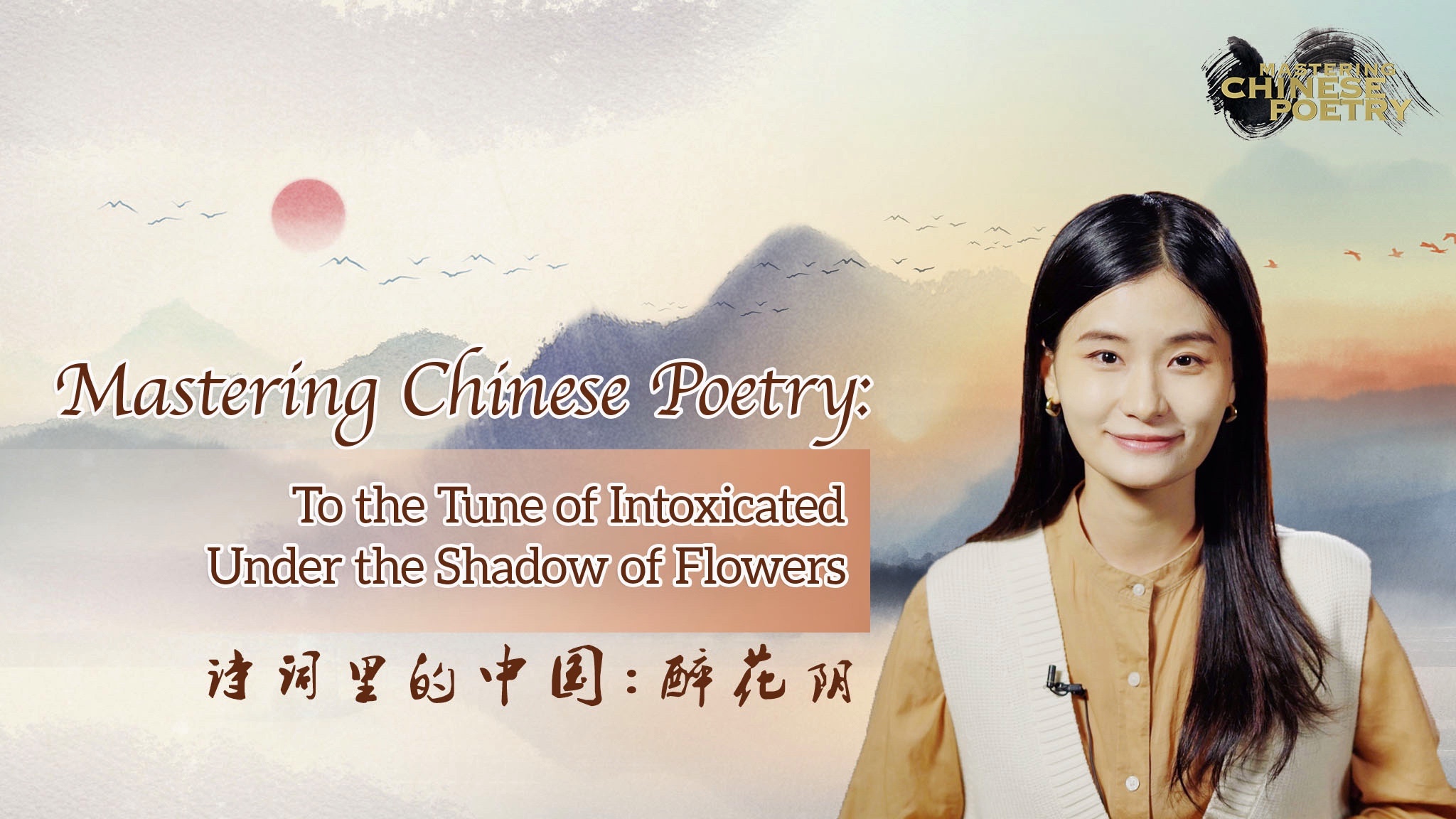04:45

zuì huā yīn• bó wù nóng yún chóu yǒng zhòu
《醉花阴•薄雾浓云愁永昼》
bó wù nóng yún chóu yǒng zhòu,ruì nǎo xiāo jīn shòu。
薄雾浓云愁永昼,瑞脑消金兽。
jiā jié yòu chóng yáng, yù zhěn shā chú, bàn yè liáng chū tòu。
佳节又重阳,玉枕纱厨,半夜凉初透。
dōng lí bǎ jiǔ huáng hūn hòu, yǒu àn xiāng yíng xiù。
东篱把酒黄昏后,有暗香盈袖。
mò dào bù xiāo hún, lián juǎn xī fēng, rén bǐ huáng huā shòu
莫道不销魂,帘卷西风,人比黄花瘦。
To the Tune of Intoxicated
Under the Shadow of Flowers
Light mists and heavy clouds,
melancholy the long dreary day.
In the golden censer
the burning incense is dying away.
It is again time
for the lovely Double-Ninth Festival;
The coolness of midnight
penetrates my screen of sheer silk
and chills my pillow of jade.
After drinking wine at twilight
under the chrysanthemum hedge,
My sleeves are perfumed
by the fragrance of the plants.
Oh, I cannot say it is not endearing,
Only, when the west wind stirs the curtain,
I see that I am more gracile
than the yellow flowers.
(Translated by Xu Yuanchong)
Welcome to CGTN's "Mastering Chinese Poetry."
This classic piece of Song Ci poetry above was written by a famous female poet of the Song Dynasty (960-1279), Li Qingzhao. She wrote the poem during the Chongyang Festival, which is also known as the Double Ninth Festival. People usually celebrate this traditional day by climbing mountains, drinking chrysanthemum wine, wearing zhuyu plants, and being with their family and loved ones.
But as we can see from the text, our poet Li spent this festival alone with wine, the wet autumn wind and those yellow flowers. She wrote the poem to express her loneliness and longing for her husband, who may have worked thousands of miles away from home.
Now, let's focus on the most classic and resonant lines.
“莫道不销魂,帘卷西风,人比黄花瘦。”
Oh, I cannot say it is not endearing,
Only, when the west wind stirs the curtain,
I see that I am more gracile than the yellow flowers.
Comparing the yellow flowers standing up in the wind with a lady suffering from lovesickness creates an even more desolate and lonely atmosphere here. The word "瘦 (gracile)" is the highlight of the sentence, and the melancholy that runs through the whole work is reflected in the most concentrated and vivid way in this word.
This phrase is something that no one has ever said before, and holds outstanding creativity.
Literally, instead of describing the pain of parting or the love itself, Li prefers to describe in detail her surroundings and the late-autumn scenery she sees, but if you read carefully, every word is soaked with her lovesickness. The combination of intelligible smoothness and remarkable depth is the key to Li's poetry style.
Now it becomes clear why this woman stands out among so many poets, especially coming from a time when female poets were not very common. She can be considered relatively lucky compared to women who lived in other dynasties in ancient China, because the Song Dynasty advocated women reading and studying literature.
She was also very gifted, with her impressive and creative works leading many to regard her as a master of wǎnyuē pài (婉约派) "the delicate restraint" school of literature.
In fact, it is said that after her husband Zhao Mingcheng received this, he was deeply moved and wanted to write a poem of the same level expressing his own emotions for his wife. He wrote for three days, producing a total of 50 poems, but none could compare to the one his wife had written.
Why not try writing one yourself at home?
Reporter: Liang Si
Videographer: Wang Yucheng
Video editor: Zhang Dian
Script writer: Liang Si
Cover designer: Zhou Jieqiong
Copy editor: Ellie Bouttell
Chief editors: Xu Jian
Producer: Li Tianfu
Executive producer: Wen Yaru
Supervisor: Zhang Shilei

